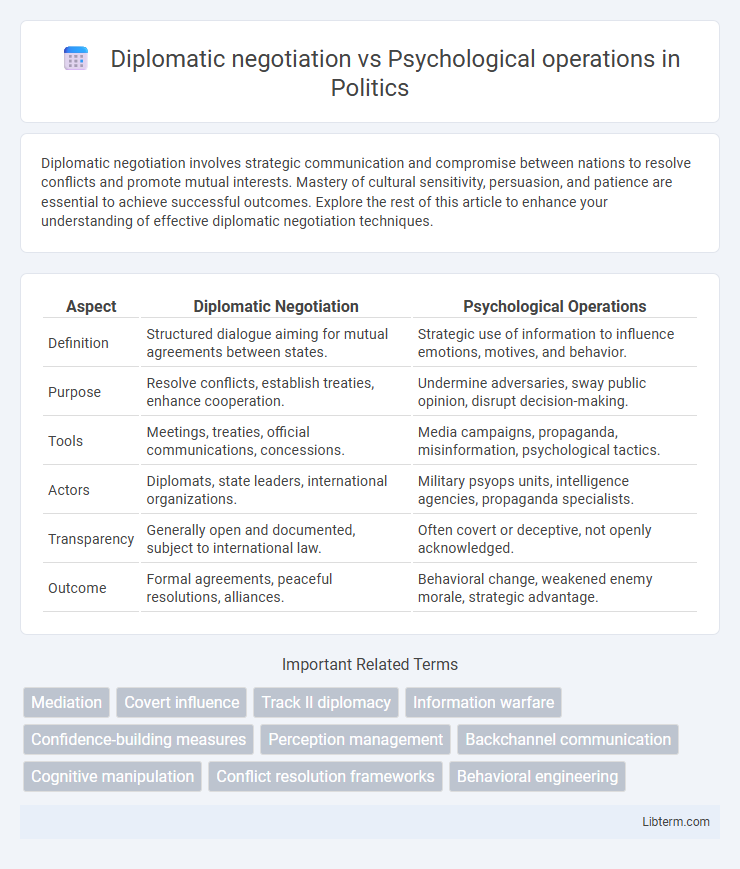Diplomatic negotiation involves strategic communication and compromise between nations to resolve conflicts and promote mutual interests. Mastery of cultural sensitivity, persuasion, and patience are essential to achieve successful outcomes. Explore the rest of this article to enhance your understanding of effective diplomatic negotiation techniques.
Table of Comparison
| Aspect | Diplomatic Negotiation | Psychological Operations |
|---|---|---|
| Definition | Structured dialogue aiming for mutual agreements between states. | Strategic use of information to influence emotions, motives, and behavior. |
| Purpose | Resolve conflicts, establish treaties, enhance cooperation. | Undermine adversaries, sway public opinion, disrupt decision-making. |
| Tools | Meetings, treaties, official communications, concessions. | Media campaigns, propaganda, misinformation, psychological tactics. |
| Actors | Diplomats, state leaders, international organizations. | Military psyops units, intelligence agencies, propaganda specialists. |
| Transparency | Generally open and documented, subject to international law. | Often covert or deceptive, not openly acknowledged. |
| Outcome | Formal agreements, peaceful resolutions, alliances. | Behavioral change, weakened enemy morale, strategic advantage. |
Introduction to Diplomatic Negotiation and Psychological Operations
Diplomatic negotiation involves strategic dialogue between states or organizations to resolve conflicts, establish agreements, and promote mutual interests through formal communication channels and international law frameworks. Psychological operations (PSYOP) are planned operations aimed at influencing the perceptions, emotions, and behaviors of target audiences to achieve specific military or political objectives. While diplomatic negotiation relies on dialogue and compromise, PSYOP employs information and propaganda techniques to shape attitudes and decision-making processes covertly or overtly.
Core Principles: Diplomacy versus Psychological Strategies
Diplomatic negotiation centers on mutual respect, communication, and compromise to resolve conflicts and build lasting agreements between states or parties. Psychological operations rely on influencing emotions, perceptions, and behaviors to achieve strategic advantages, often through deception and information manipulation. While diplomacy pursues transparency and trust to foster cooperation, psychological strategies aim to sway decision-making subconsciously to disrupt or control adversaries.
Historical Context: Evolution of Both Approaches
Diplomatic negotiation originated in ancient empires such as Mesopotamia and Egypt, evolving through treaties and alliances in medieval Europe to become a formalized process within international relations. Psychological operations developed prominently during World War II, utilizing propaganda and misinformation to influence enemy morale and civilian populations, with advancements accelerating through the Cold War era. Both approaches have continuously adapted to technological innovations and shifting geopolitical landscapes, reflecting a dynamic interplay between overt diplomatic engagement and covert psychological influence.
Objectives and Desired Outcomes
Diplomatic negotiation aims to achieve mutually acceptable agreements by resolving conflicts through dialogue, fostering alliances, and maintaining peaceful international relations. Psychological operations focus on influencing attitudes and behaviors of target populations or adversaries to gain strategic advantages without direct confrontation. The desired outcome of diplomatic negotiation is sustainable cooperation and conflict resolution, while psychological operations seek to undermine enemy morale, shape perceptions, and create conditions favorable to mission success.
Key Actors and Stakeholders
Diplomatic negotiation primarily involves state actors such as diplomats, foreign ministers, and heads of state who represent national interests and engage in dialogue to resolve conflicts or forge agreements. Psychological operations (PSYOP) are usually conducted by military units, intelligence agencies, and specialized psychological warfare experts aiming to influence the perceptions and behaviors of target audiences, including enemy forces and civilian populations. Both processes rely on key stakeholders like government officials and security agencies, but while diplomatic negotiation centers on formal dialogue and consensus-building, PSYOP focuses on strategic messaging and information control.
Communication Techniques and Tools
Diplomatic negotiation employs communication techniques such as active listening, persuasion, and cultural sensitivity to build trust and reach mutually beneficial agreements, often utilizing formal tools like treaties, diplomatic cables, and backchannel communications. Psychological operations focus on influencing target audiences' perceptions and behaviors through strategic messaging, propaganda, and media manipulation, leveraging tools like social media platforms, psychological profiling, and targeted information campaigns. Both fields prioritize tailored messaging but differ in their goals: diplomacy seeks consensus and cooperation, while psychological operations aim to disrupt or control adversary decision-making processes.
Case Studies: Successful Diplomatic Negotiations
Successful diplomatic negotiations, such as the Camp David Accords between Egypt and Israel in 1978, highlight the effectiveness of direct dialogue and compromise in resolving long-standing conflicts. The Good Friday Agreement of 1998 further exemplifies the power of multilateral discussions in achieving peace through inclusive political frameworks. These cases demonstrate that diplomatic negotiations prioritize mutual understanding and legal agreements, contrasting with psychological operations that focus on influencing perceptions and behavior.
Case Studies: Effective Psychological Operations
Effective psychological operations (PSYOP) have been pivotal in conflicts such as the Gulf War, where coalition forces successfully used misinformation campaigns to weaken Iraqi troop morale and prompt surrenders without extensive combat. The Vietnam War offers another case, highlighting both successes and failures of psychological tactics, as U.S. forces attempted to sway local populations and enemy soldiers through leaflets and broadcasts. These case studies demonstrate how psychological operations can complement or substitute traditional diplomatic negotiations by shaping perceptions and influencing decision-making processes during conflict resolution.
Ethical Considerations and Controversies
Diplomatic negotiation emphasizes transparency, mutual respect, and adherence to international law to maintain ethical standards in resolving conflicts. Psychological operations often raise ethical controversies due to manipulation, misinformation, and potential violations of human rights, challenging moral boundaries in warfare and intelligence activities. Balancing the effectiveness of psychological tactics with respect for ethical principles remains a critical concern in both fields.
Future Trends in International Relations
Future trends in international relations indicate a growing interplay between diplomatic negotiation and psychological operations, where states increasingly integrate cognitive strategies to influence adversaries and allies alike. The rise of digital platforms and artificial intelligence enables sophisticated psychological operations that complement traditional diplomacy by shaping public opinion and decision-making processes at a global scale. Enhanced data analytics and real-time communication tools drive more adaptive diplomatic tactics, merging soft power with covert influence techniques to achieve strategic geopolitical objectives.
Diplomatic negotiation Infographic

 libterm.com
libterm.com